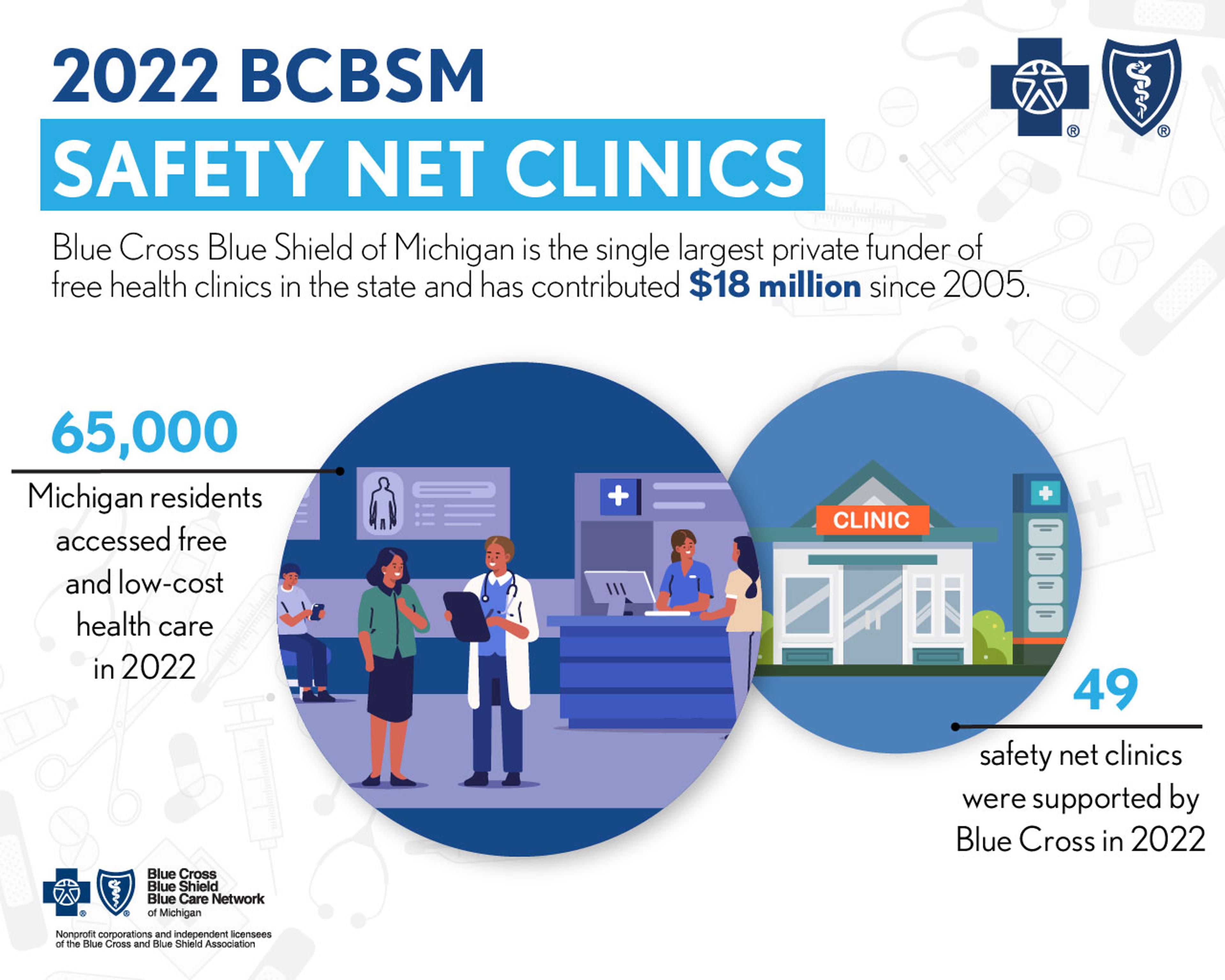4 Ways Health Care Became Easier for Michiganders to Access in 2022
Amy Barczy
| 5 min read
Amy Barczy is a former brand journalist who authored content at Blue Cross Blue Shield of Michigan. Prior to her time at Blue Cross from 2019-2024, she was a statewide news reporter for MLive.com. She has a decade of storytelling experience in local news media markets including Lansing, Grand Rapids, Holland, Ann Arbor and Port Huron.

Free and low-cost health care for those in need, mental health professionals available when you get an annual physical and new doctor’s offices for seniors – these are just a few of the ways Michiganders benefitted from programs supported by Blue Cross Blue Shield of Michigan this year – member or not.
For the most vulnerable members of our communities, health care can be just out of reach – which can lead to worse health outcomes for the individual and higher costs for everyone.
Blue Cross is ready to help as a community partner to break down barriers to receiving quality, accessible care with practical solutions. Here are some of the latest ways care options have been recently expanded in Michigan.
Access to free or low-cost health care
At the age of 16, Sani Campoverde was in crisis, struggling with crippling depression that was getting worse with the isolation of attending high school online during the pandemic. They were at risk of not graduating. With the help of a free summer program through Centro Multicultural La Familia, a safety net clinic in Pontiac, Campoverde was able to get back on track and reconnect to mental health treatment.
“Being in that summer youth employment program helped me crack out of that shell that I was stuck in,” Campoverde said, recalling how the consistency of the program helped them. “I was reflecting on, this is me doing something great every day, trying to help myself get out of bed. I know for other people, being there every day was something that helped them – an extended support outside of their own houses.”
Campoverde is among more than 65,000 Michigan residents who were able to receive free and low-cost health care and connections to community services and programs at 49 safety net clinics Blue Cross helped to support in 2022.
These safety net clinics serve people who are low-income or uninsured with free medical care, as well as dental, mental health, vision, specialty care and help with medications. They’re a way for people to manage their mental and physical conditions, get connected to resources and live healthier lives.
Safety net clinics also help people avoid emergency room visits. Emergency rooms are often the first place people without a doctor or insurance go for health care: nearly one in five Detroiters (17.2%) report that they typically go to the hospital emergency room when they feel sick, and this is even more common among those who lack health insurance.
Yet the average emergency room visit is $2,000 – and for those who can’t pay the bill, the health care system must cover the cost. The result: costs go up for everyone.
Safety net clinics help to prevent these costly ER visits by increasing access to preventive care to provide mental health care and interventions – like in the case of 16-year-old Campoverde – and catch health conditions like diabetes and heart disease earlier. This saves lives and reduces the overall cost of health care.
As the single largest private funder of free health clinics in the state, Blue Cross has contributed $18 million since 2005.

Health care connections for at-risk individuals
Individuals affected by homelessness and/or substance use disorder, as well as those who are formerly incarcerated, face significant health disparities – and are at a higher risk for disease and mental health issues.
Together with funding partners, the Blue Cross Blue Shield of Michigan Foundation is helping five organizations that work to help these individuals build bridges to the health care and resources they need in order to build more stable, healthier lives.
New doctor’s offices for seniors
“It’s in the neighborhoods. And it’s convenient, it’s clean. The doctors are going to dig deep into what your medical history is,” said Leroy Spencer, a patient at a Dedicated Senior Medical Center. “Once you come here, they make you feel like you’re family.”
Spencer is a patient at one of nearly 20 new primary care offices have opened in the past two years to help thousands of senior citizens in previously underserved areas of Metro Detroit and Southeast Michigan. It’s an effort being driven by Blue Cross through partnerships with Oak Street Health and Dedicated Senior Medical Centers.
These centers provide health care closer to home for seniors in the neighborhoods where they live – removing transportation barriers and building stronger connections with doctors. This personal attention is especially important for seniors with multiple chronic health conditions who are managing multiple medications and complex treatment plans.
Mental health professionals now available at 200+ primary care offices
Struggling with depression and anxiety for more than 20 years, a patient at Bronson Medical Group was resolved to a life dominated by her conditions. After beginning a new Collaborative Care program at her primary care provider’s office in which she was able to switch medication and meet regularly with a social worker, the patient has seen huge changes in her life after eight months.
Here’s what she had to say: “Doing this program has made me more comfortable in opening up about issues and concerns. I’m proud of myself in how far I have come after being miserable for so long. I am very grateful that I accepted the opportunity to do this.”
The Collaborative Care program is a groundbreaking new approach by Blue Cross to help primary care doctors coordinate their patients’ mental and behavioral health care in their own practices. Behavioral health specialists have been embedded into more than 200 primary care offices in Michigan to collaborate on patient cases – helping remove stigma and removing barriers to getting mental health help.
The Collaborative Care program supports whole person health by addressing a patient’s mental and physical health concerns in the same practice. It’s not just Blue Cross members who benefit – any patient seeing a provider in this program will have their care coordinated.
All four of these solutions drive value to members, customers and the health care system as a whole: increasing access to care helps individuals avoid costly emergency room visits, manage their mental and physical health – and ultimately reduce costs. As Michigan’s leading health insurer, we’re continuously searching for new ways to increase access to care and support whole person health.
For more information on how Blue Cross is ready to help, visit MIBluesPerspectives.com.
Photo credit: Getty Images





